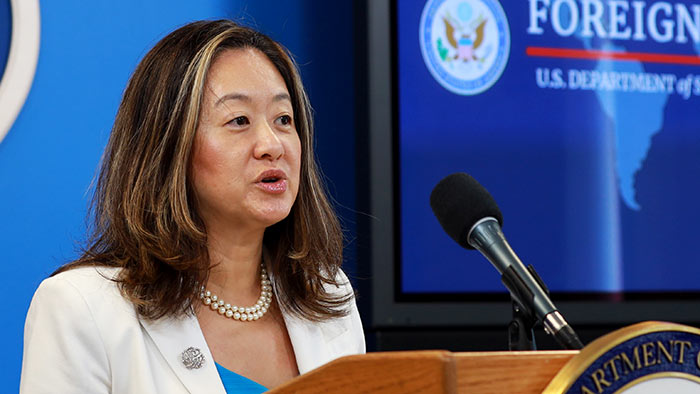
Speaking before the Senate Committee on Foreign Relations, Julie Chung, US nominee ambassador to Sri Lanka, emphasised her commitment "to speaking clearly and consistently in support of democratic values, human rights and a strong civil society".
Chung's previous posting was as the Acting Assistant Secretary in the Bureau of Western Hemisphere Affairs and she is replacing Alaina B. Teplitz as Ambassador to Sri Lanka. Chung has served in a variety of roles including as Principal Deputy Assistant Secretary and serving for roles in Japan, Vietnam, Thailand, Cambodia, Colombia, and Iraq.
Justice, accountability, and reconciliation
In her statement stressed the need for the US to encourage "justice, accountability, and reconciliation" and highlighted the importance of engaging with "many voices of the Sri Lankan diaspora in the United States". The statement comes as Sri Lanka foreign minister, GL Peiris, told the Daily Mirror that would not engage with Tamil diaspora groups which the government had proscribed as terrorist organisations. Earlier this year, Sri Lanka imposed a wide-ranging proscription on hundreds of individuals and several Tamil diaspora organisations which have been campaigning on human rights issues.
The strategic importance of Sri Lanka
Chung also detailed the importance of Sri Lanka stating that "its critical ports with access to global maritime lanes and trading routes play a pivotal role in a free and open Indo-Pacific architecture".
Bill Haggerty, Senator for Tennesse, noted the importance of Sri Lanka and raised concerns over Sri Lanka's growing dependency on China. Haggerty raised alarm over China's use of debt-trap diplomacy and highlighted Sri Lanka's leasing of both the Hambantota and Colombo ports which provided China with a "strategic foothold" in the region.
The Senator further highlighted the strained relationship that the US had with Sri Lanka noting the island's opposition to "a renegotiation of a status force agreement and the Millennium Challenge Corporation (MCC) compact".
Responding to questions posed by Haggerty, on how the US can push back against China and revitalise relationships, Chung emphasised the need to provide alternatives and to broaden public diplomacy efforts.
"I think we can go a long way at doing more public diplomacy and engaging with all stakeholders on the ground beyond the government. With civil society, with journalists, and with those who feel affected by such projects and the future".
Chung has previously expressed concern over Chinese debt diplomacy telling the US Senate last September
“We see their [China's] investment hurting the environment, violating local labour laws. We’ve brought these issues to light with the region and raised it with our government counterparts”.
Read more here: US nominee ambassador to Sri Lanka is critical of Chinese influence
Sri Lanka's economic crisis
Responding to a question on Sri Lanka's current economic crisis, Chung emphasised that a possible solution to current economic woes would be to turn to the International Monetary Fund (IMF) to "consider steps for debt restructuring".
Chung emphasised how dire Sri Lanka's situation is with the debt to GDP ratio exceeding 100%. Earlier this year, a Bloomberg model, Sri Lanka’s default probability was the highest in Asia with the organisation estimating a 27.9% chance of one-year default. Despite this all, the Economist warns that Sri Lanka is unlikely to turn to the IMF as it would "undermine the country’s much-vaunted sovereignty" and would further lose the confidence of its voters.
